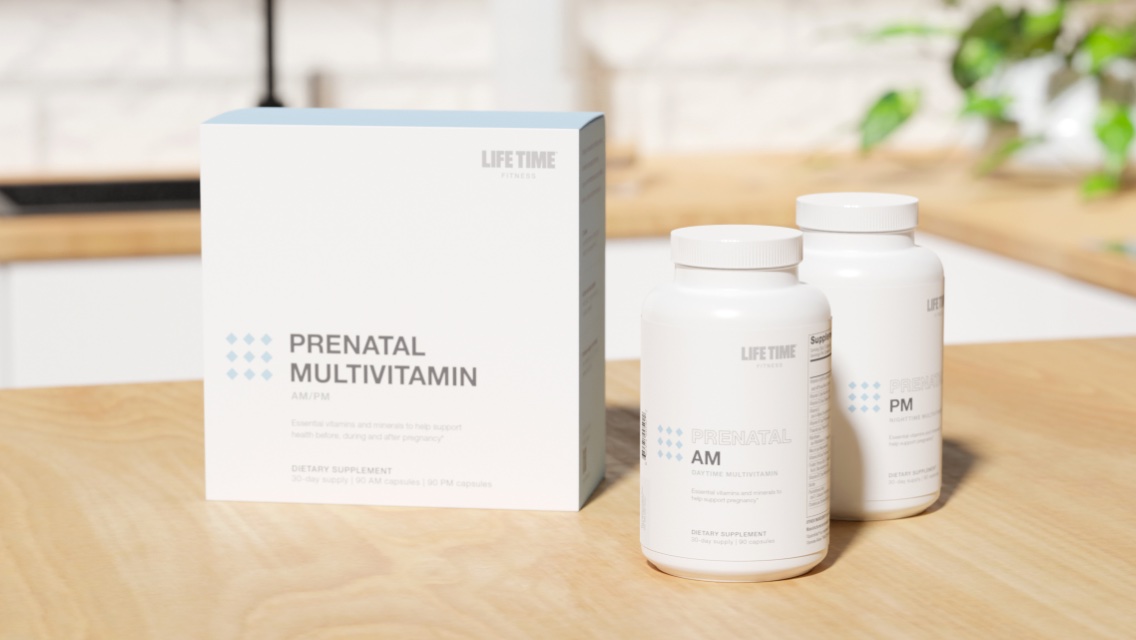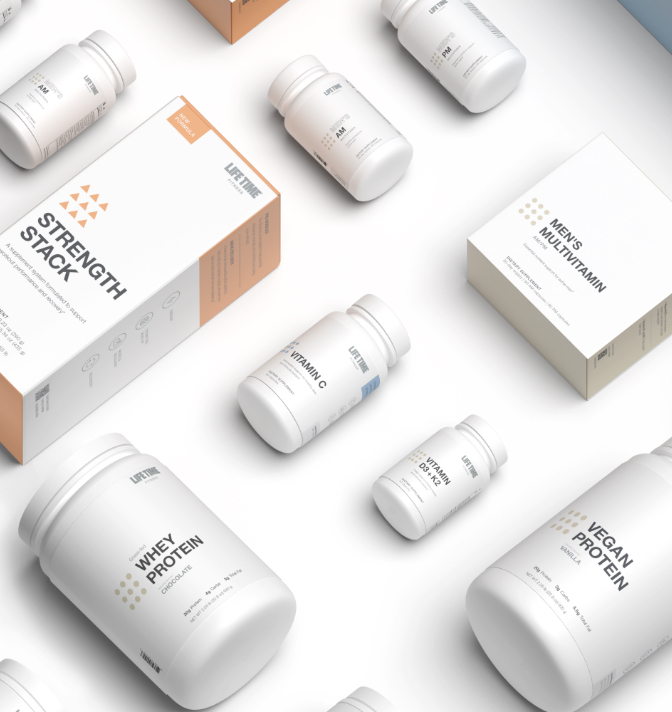Much of the food-related speak we hear pertaining to pregnancy revolves around the mentality of “eating for two,” new crazy cravings, or the default to snacking on crackers upon crackers because it’s all someone can keep down.
Nausea, increased hunger, and strange hankerings are indeed very real parts of pregnancy for many women, and can make it tempting to let healthy-eating habits slip in favor of whatever sounds appealing — or even use as an excuse to indulge.
But this is not the time to forgo a focus on adequate protein, fiber, and healthy fats, stresses Samantha McKinney, RD, Master Trainer at Life Time. “As someone who had a baby less than a year ago, I understand all too well how the changes your body’s going through can make it less than appealing to pick broccoli over ice cream,” she acknowledges. “But as a dietitian and health professional, I know that pregnancy is probably one of the most complex metabolic times in a woman’s life, so I would never recommend throwing out the rules of healthy eating while you’re pregnant.”
She continues: “There are certain development processes happening in utero that are influenced by nutrition that you can’t ever go back and redo — and that can potentially have lifelong implications. I don’t say that to instill fear or shame, but to heighten awareness of the importance of nutrition during pregnancy. It deserves to be taken seriously.”
It can be hard, however, to get all the nutrients we need from food alone under normal circumstances; knowing there are specific and increased needs to support a healthy body and healthy baby during this time makes it even more important to supplement for any potential gaps. That’s where a quality prenatal multivitamin can really help.
Necessary Nutrients
Even if you are committed to healthy eating during pregnancy, getting adequate nutrition can still be difficult. “We know between our food supply and all the changes to your appetite, it’s often difficult to get adequate levels of the vitamins and minerals without a multivitamin,” says Paul Kriegler, RD, director of nutritional product development at Life Time. “However, you’re only best supported if you ensure you’re taking a quality multivitamin. Not everything on the market is created equal.”
“Some people get a misleading sense of security if they see that a certain nutrient hits 100 percent of the Recommended Dietary Allowance, or RDA,” says McKinney. “RDAs can be helpful, but in some cases can be imperfect estimates. For prenatals, they may not take into account all of the complex metabolic shifts that can increase demand or influence how certain nutrients are absorbed or excreted during pregnancy.”
She continues, “For example, research suggests that optimal vitamin B12 intake during pregnancy is well above the RDA. So, you do have to be a bit more thorough than simply looking at RDAs when selecting a top-quality product.”
These are the nutrients our Life Time nutrition experts call out as being particularly important during and around the time of pregnancy. (Of course, always consult your healthcare team prior to adding any new supplements to your regimen to review the doses and forms that are right for you.)
CHOLINE is critical for supporting a healthy liver and brain, as well as nervous-system development. It works closely with folate to help prevent neural-tube defects and support cognitive function. The richest food sources of choline are liver and egg yolks, which aren’t typically commonly consumed foods, especially during pregnancy.
“Life Time’s Prenatal Multivitamin is actually the first of its kind to have an adequate amount of choline in it,” says Kriegler. “Most prenatal supplements on the market either don’t contain choline at all, or only carry small traces of it.”
Suggested dose: The RDA for choline in women of reproductive age is 425 mg/day, which is increased during pregnancy to 450 mg/day and 550 mg/day during lactation.
FOLATE is important for the development of the baby’s heart and to prevent neural tube defects. Look for formulas containing methylated folate versus folic acid (read more on why below).
Suggested dose: at least 800 mcg of methylated folate.
IODINE supports the fetus’s brain development and is important for the mom’s thyroid health. Fish is the most common food source — though it is not a frequently craved food during pregnancy.
Suggested dose: At least 220 mcg of iodine during pregnancy and 290 mcg/day during lactation.
IRON is necessary for healthy red-blood-cell development. Some forms can be tough on the stomach, so look for a gentle, well-tolerated form such as ferrous bisglycinate chelate.
Suggested dose: The RDA for iron during pregnancy is 27 mg/day, but individual needs can vary; it’s best to monitor your iron levels with blood tests through your doctor before supplementing with 100 percent of the RDA for iron.
ZINC is a key nutrient for thyroid function and during pregnancy, the fetus relies on the mother for thyroid hormones. This puts a significant demand on the thyroid and is often a reason that women are diagnosed with thyroid conditions post-partum.
Low zinc status during pregnancy is also linked to gestational diabetes and pre-eclampsia (dangerously high blood pressure in pregnancy).
“A lot of supplements on the market contain a cheap form of zinc,” says McKinney. “To better support absorption of minerals, including zinc, aim to find options that are wrapped in amino acids (chelated). One example is zinc bisglycinate chelate.”
Suggested dose: The RDA during pregnancy and lactation are 11 mg/day and 12 mg/day, respectively.
VITAMINS B12 and B6 — together with choline, zinc, vitamin A, and a few other key nutrients — both play a role in the development and structure of the fetus’s organs in the first few months of pregnancy.
Vitamin B12 is another critical nutrient for preventing neural- tube defects; it’s important for nervous-system functioning and myelination, or the formation of the insulating layers around nerves. Vitamin B6 (pyridoxine) is important for energy production and can potentially help prevent nausea during the first trimester.
Suggested dose: The RDA for vitamin B12 during pregnancy is 2.2 mcg/day, though higher intakes may be required for women who exercise or women who seldom eat animal products. The best forms of vitamin B12 are methylcobalamin or adenosylcobalamin (avoid cyanocobalamin).
To help manage morning sickness, the typical dose recommended for vitamin B6 is between 10 and 25 mg, three times per day; this equates to over 500 percent of the RDA each dose. Look for the pyridoxal-5-phosphate form of vitamin B6 rather than the synthetic form, pyridoxine hydrochloride.
VITAMIN A is critical for healthy-vision development; deficiency is one of the leading causes worldwide of preventable blindness. It also has a systemic effect on the development of the skeletons and organs.
Note that there is some level of confusion around the role of vitamin A in pregnancy, with some outdated recommendations suggesting to avoid it to prevent birth defects. While you don’t want to take vitamin A as a standalone supplement (unless otherwise directed by your physician) or consume excessive amounts of liver (which is high in vitamin A), aiming to get adequate vitamin A is crucial.
Suggested dose: 770 mcg/day. Ideally, some of it is in its activated form, retinyl palmitate, not only from beta carotene.
VITAMINS D3 and K2 work together in the body to support calcium absorption and bone formation. Vitamin D3 is also needed for immune resilience, and it’s a nutrient that up to 80 percent of people are deficient or insufficient in. Vitamin K2 is also extremely important for immune and cardiovascular health.
Suggested dose: At least 75 mcg or 3,000 IU of vitamin D and around 75 mcg of vitamin K, as both vitamin K1 and vitamin K2 (menaquinone-7 or menaquinone-4).
Folate vs. Folic Acid
Folic acid is a common nutrient that comes to mind for many when thinking about pregnancy needs. However, a methylated form of folate is typically the safer and superior choice.
Folic acid is the synthetic form of folate, meaning if you take it, you have to be able to convert folic acid into the usable form of folate in order to reap the benefits. However, estimates show that anywhere between 15 to 50 percent of the population possesses a MTHFR genetic mutation, which prevents individuals from being able to process folic acid well. There is also some evidence that unmetabolized folic acid can cause some nervous-system deficits or neurological disorders.
“Unless you’ve had genetic testing done to rule out MTHFR genetic mutation, it’s general best practice to make sure you’re taking methylated folate instead,” says McKinney.
The Nausea Obstacle
During pregnancy, and the first trimester in particular, most women lack a desire to eat adequate amounts of meat and fish, which are sources of key nutrients including protein, vitamin B12, iron, choline, iodine, and zinc.
The same goes for choline-containing foods like those mentioned above (liver, organ meats, and egg yolks). “Even most typical diets don’t contain liver or organ meats, while many often opt for egg whites over egg yolks,” says Kriegler.
This can be a challenging part of pregnancy nutrition: The foods you may not have a huge appetite for often contain the key nutrients you most need for proper fetal development.
“Although these foods may be making you nauseous or you might be unable to physically eat them, that doesn’t change the fact that both you and your developing baby still need the nutrients in them to support optimal health,” says McKinney. “That’s just one of the reasons we really encourage a quality prenatal multivitamin: You’re able to support your body with the nutrients from a nonfood source when your intake of real foods has shifted.”
If you’re able to take a prenatal multivitamin prior to conception, one additional benefit is that it may help to potentially alleviate some nausea.
“Magnesium and vitamin B6 are both commonly recommended to help expectant mothers treat nausea,” says McKinney. “If you have a solid baseline of those nutrients pre-conception, it may set the stage for you to have more sufficient levels before you conceive and head into that first trimester. However, some cases of nausea may be related to fluctuating thyroid hormones or other underlying factors — every pregnancy is different.”
Before, During, and After Pregnancy
Many women consider a prenatal supplement during pregnancy, but it can offer benefits when taken prior to conception and post-partum as well.
“Healthy nutrition is critical pre-conception because if you’re not optimally nourished, you may have difficulty conceiving or experience a riskier pregnancy,” says Kriegler.
McKinney concurs: “If possible, at a minimum, I would suggest beginning to take a quality prenatal vitamin three months before trying to become pregnant, and if you’re able to, six months to a year in advance would be ideal.” This helps give your body time to reap full benefits from the nutrients.
That being said, planning in advance is not always possible, so know it’s never too late to start.
“Every stage of pregnancy is important,” says McKinney. “Even if you’re in the midst or near the end of your pregnancy while you’re reading this, I would still encourage you to optimize your nutrition and food choices and begin taking a quality prenatal multivitamin.”
When you deliver the baby, whether vaginally or via caesarean, it’s a huge endeavor for your body. There’s a lot of healing and recovery that needs to happen, and sufficient levels of nutrients are critical for supporting that process.
If you choose to breastfeed, that’s also a significant demand on your body, and there are actually certain nutrients that are in even higher demand during breastfeeding than during pregnancy. “Breastmilk is miraculous in the way your body can produce and adjust it according to baby’s needs, but you can also influence the composition of it based on your nutrient intake,” says McKinney. Specifically, it can be helpful to be mindful of taking of vitamin B12, dietary fat, and fat-soluble vitamins (such as vitamin D and vitamin A) when breastfeeding.
Our Formulation
Life Time’s Prenatal AM/PM Multivitamin was designed to support women through all stages of their reproductive lifecycle: pre-conception, pregnancy, delivery, and post-partum. It’s also formulated to meet the increased needs of women who stay active their entire pregnancy, but is still supportive if you are more sedentary.
The AM/PM formulation is very purposeful. Your body has different needs in the morning and in the evening, and the nutrients and doses included in each is intended to best support that. For example, the AM formula supports energy, while the PM formula aids in restful sleep.
You’ll take six capsules per day — three “AM” caps in the morning, three “PM” caps in the evening — which is the smallest number of capsules that can accommodate the desired formula ingredients. “Life Time refuses to artificially condense supplements into difficult-to-digest tablets or include less-than-desireable nutrient amounts just to fit it into fewer capsules,” says McKinney. “It’s important to include nutrients in efficacious, supportive amounts and in a form that your body can better break down and utilize for positive metabolic change for you and your baby.”
Kriegler adds, “There’s no good way to formulate with the right types of ingredients and amounts in a single tablet or gummy format,” says Kriegler. “Capsules really are the best: They’re high potency, easy to digest, less likely to cause nausea, and are compatible with all the top forms of nutrients.”
Life Time’s prenatal multivitamin includes not only the important nutrients noted above, but also vanadyl sulfate to promote healthy glucose tolerance; vitamin E to help support immune function and skin health; and other chelated minerals, including calcium, magnesium, selenium, copper, chromium, and molybdenum.
As with all Life Time supplements, our formulations never contain any potentially harmful binders, fillers, or additives. All the ingredients are tested multiple times:
- Prior to arriving at the facility for manufacturing, they are tested puracy, potency, and identity;
- During blending, they are tested again;
- As a finished product, they are tested again to ensure they’re safe and effective.
“Obviously, supplementation is not a replacement for food — it’s meant to enhance your intake of the vital nutrients needed in an effort to optimize health,” says McKinney. “And using a quality prenatal supplement is still fruitful even during those first few months when you may only be able to stomach crackers, chips, and PB&Js. Aim to eat as healthfully as you realistically can, and remember that during those times, using the right supplements becomes especially critical to fill in those missing nutrient gaps to the best of your ability.”





